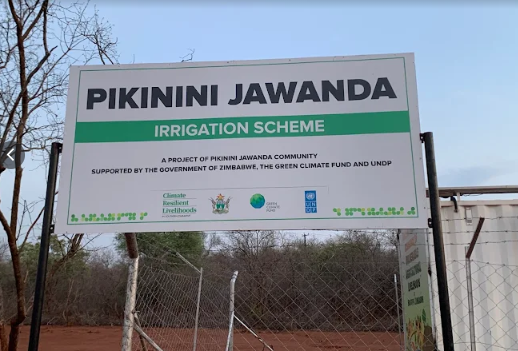Harare, 1 October 2025 – The Climate Resilient Livelihoods Project—supported by UNDP Zimbabwe, the Government of Zimbabwe, and the Green Climate Fund (GCF)—is transforming smallholder farmers in Mwenezi into agribusiness partners through the Pikinini Jawanda Irrigation Scheme.
On 30 of the scheme’s 156 hectares, farmers have entered into a groundbreaking contract with Seed Co Pvt Ltd to produce sugar bean seed, with a target of 54 tonnes this season. The partnership provides farmers with certified seed, technical guidance, and guaranteed markets, embedding them into structured national and regional value chains.
For the 300 households that depend on the scheme, the shift is life-changing.
Last season, members harvested 19 tonnes of grain for household use and earned nearly USD 4,000 from sales reinvested to strengthen operations.
“We now see farming as a business, not just survival,” said one farmer.
Eurita Mahove, a mother and member of the scheme, explained.
“With this partnership, I no longer worry about our next meal. I can plan for school fees, invest in our future, and I look forward to tomorrow with hope.”
Seed Co’s Head of Agronomy, Mrs. Wendy Madzura, called the collaboration “a win–win,” citing mutual benefits for farmers and seed markets. Government officials also endorsed the model:
“To grow into a viable agribusiness, farmers need private sector partnerships, and we are hoping all our irrigation schemes can take up this model,” said Professor Obert Jiri, Permanent Secretary in the Ministry of Lands, Agriculture, Fisheries, Water and Rural Development.
UNDP Resident Representative, Dr. Ayodele Odusola, described the scheme as “a quick way to get people out of poverty and contribute to the nation’s development.”
Looking ahead, discussions are already underway to transform Pikinini Jawanda into a Seed Co distribution hub, expanding its role beyond production.
Scheme chairperson Mr. Chizivano Shava expressed optimism.
“This collaboration has proven we can go beyond subsistence farming.
“This is just the beginning; we want to become a major producer for Zimbabwe and beyond.”



